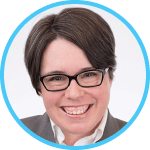As an ASAE Diversity Executive Leadership Program (DELP) scholar, Senior Director of Academic Affairs Dr. Cecilia M. Plaza hopes to apply the lessons learned in association management to increasing diversity and inclusion within AACP and ultimately patient care.
By Athena Ponushis
DELP is a two-year program that supports 12 individuals from under-represented identity groups to advance into the ranks of leadership in the association management profession. Plaza is the first pharmacist to ever participate in the program, and she’ll take part in accelerated leadership activities in education, mentoring and volunteer service within the association community.
In the realm of academic affairs at AACP, Plaza oversees curricular and institutional quality improvement, institutional research, assessment and accreditation, and the American Journal of Pharmaceutical Education. As the director for the Center for the Advancement of Pharmacy Education (CAPE), Plaza led the panel that revised and expanded the educational outcomes by which all pharmacy graduates are educated at colleges and schools of pharmacy in the United States. Currently, Plaza also serves on the ASAE Diversity and Inclusion Committee.
“As pharmacists, we tend to just look at other health associations or other pharmacy organizations, but we really have more in common with other groups than we think,” Plaza says. “That’s the strength this program helps bring: it exposes me purposefully to other associations that are very different in terms of content but not different in terms of best practices and the way things could be done.”
Plaza says she’s honored to have this opportunity to explore the association management side of herself. She’s a firm believer that we should celebrate what we have in common just as we celebrate what makes us different. Here, she opens up about what she’s learning, where she’s going and what she hopes to bring back to AACP and its members.


 As pharmacists, we tend to just look at other health associations or other pharmacy organizations, but we really have more in common with other groups than we think.
As pharmacists, we tend to just look at other health associations or other pharmacy organizations, but we really have more in common with other groups than we think.